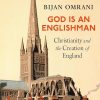God is an Englishman: Christianity and the Creation of England
£13.30
‘Allows us to understand the profound, and often profoundly beneficial, impact of Christianity’ Anthony Seldon
‘Superb … Lively and erudite’ The Telegraph
‘Tremendous … The arguments are truly profound’ The Spectator
Christianity in England is in decline. Congregations are dwindling and ever fewer young people believe. Should we merely shrug our shoulders and accept this as inevitable and even healthy, or is something important being lost?
Bijan Omrani argues that this decline is the most momentous change to occur in English history. He shows how a religion that has been part of our national story for over 1700 years was instrumental in the creation and development of the English nation, its codes of law and morality, and its structures of government and kingship. He demonstrates its profound cultural impact, in areas ranging from architecture and literature to our very landscape and the structure of our everyday life and language. Its influence, he contends, has been enormous, largely benign, and shouldn’t be lightly abandoned.
Ending with a rousing call to retain Christianity, rightly understood, as a way of dealing with both the eternal questions of the human condition, as well as the malaises of modernity, this is an erudite and tender tribute to our Christian history and heritage.
Read more
Additional information
| Publisher | Forum (24 April 2025) |
|---|---|
| Language | English |
| File size | 1.8 MB |
| Text-to-Speech | Enabled |
| Screen Reader | Supported |
| Enhanced typesetting | Enabled |
| X-Ray | Not Enabled |
| Word Wise | Enabled |
| Print length | 480 pages |




by George Owers
A superb book which demonstrates in engaging detail the extent to which England’s history and culture – in areas ranging from law, art, music, literature, civic society and so on – is rooted in the Christian faith. The author has a good eye for telling examples and anecdotes, writes very well, and makes a compelling argument. The book ends with a nuanced and convincing argument for the continued relevance of the Christian faith in the 21st century, despite falling church attendance and the rise of secularisation. If you are a Christian, it is essential reading, but to be honest anyone, of whatever religious beliefs, who is interested in English history, culture and identity will be enormously better informed for having read it. The chapters on law and art are particular highlights.